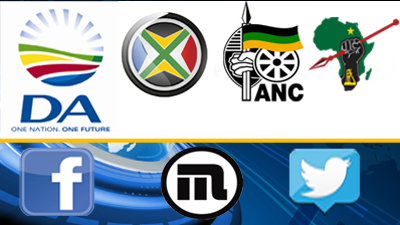With just a few weeks to go before Election Day, political parties are using every available tool to woo voters. In the past rallies and door-to-door campaigns were the norm, but today, the new tool is social media.
Social networking sites like Facebook, Twitter and YouTube have emerged as important electoral campaigning tools.
The impact of social media campaigning was first evident during the 2008 American elections. This, when President Barack Obama outmaneuvered his opponent through the expert use of social media.
Closer to home, Kenyan President Uhuru Kenyatta’s use of social media played a pivotal role in his 2013 winning campaign.
Now the pressure is on South African politicians to follow the trend.
Political Analyst, Professor Shadrack Gutto, says: “Indeed with the advent of internet, the advent of multimedia, where you have twitters, you have facebook … you have very easy-to-use and far-reaching communication ability. It would really be surprising if it isn’t used effectively by some political parties in the coming elections.”
However, Professor Gutto warned politicians to tread carefully as one wrong statement could quickly go viral.
“Of course you have to thread carefully. The fact that you can connect very easily and communicate with people through Twitter and Facebook … it requires diligence. You have to use it strategically and not just rush as it spreads quickly.”
Social media is popular in South Africa due to the high penetration of Smartphones. Research shows that Facebook has over 9 million active users in the country and Twitter is growing rapidly with over 5 million users.
Johannesburg has emerged as the top tweeting city in Africa.
The IEC says it foresees more people coming to the polls on May 7th, due to social media buzz
Social Media Expert Sholain Govender-Bateman, says: “The media consumption of young people and middle class as well as anyone who has a smartphone is moving to social media platforms.”
Govender-Bateman says only a few parties are doing well in the online sphere.
“The DA is ahead in the game. It’s because they got a good communication team and it looks like they actually set down and strategized and included social media among other platforms to spread their message.”
South African opposition parties and their respective leaders are highly active on social media.
DA Leader, Helen Zille, has just fewer than 400 000 twitter followers.
EFF Leader, Julius Malema, has close to half a million.
Political analysts, however, have warned that impressive social media following will not necessarily translate into votes.
The Independent Electoral Commission has also turned to social media to encourage potential young voters to register.
IEC Deputy Chief Electoral Officer, Dr Nomsa Masuku, says: “We took our mainstream campaign and we gave it a youth focus and a very strong presence on social media.”
The 2014 elections in South Africa have been dubbed the most interesting yet. However, fear that young voters might not flock to the polling stations remains. But with the uptake of social media, politicians might be pushing the right buttons to encourage them to vote.
The IEC says it foresees more people coming to the polls on May 7th, due to social media buzz.
“You post a selfie there and you already engaging with everybody. I think it has really changed the way that politics can potentially play out.”
– By


